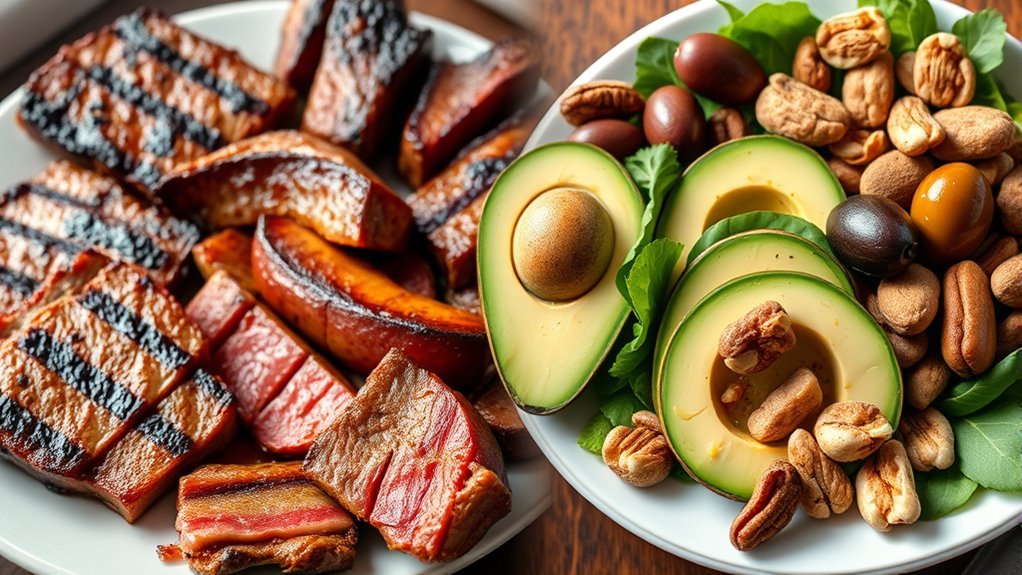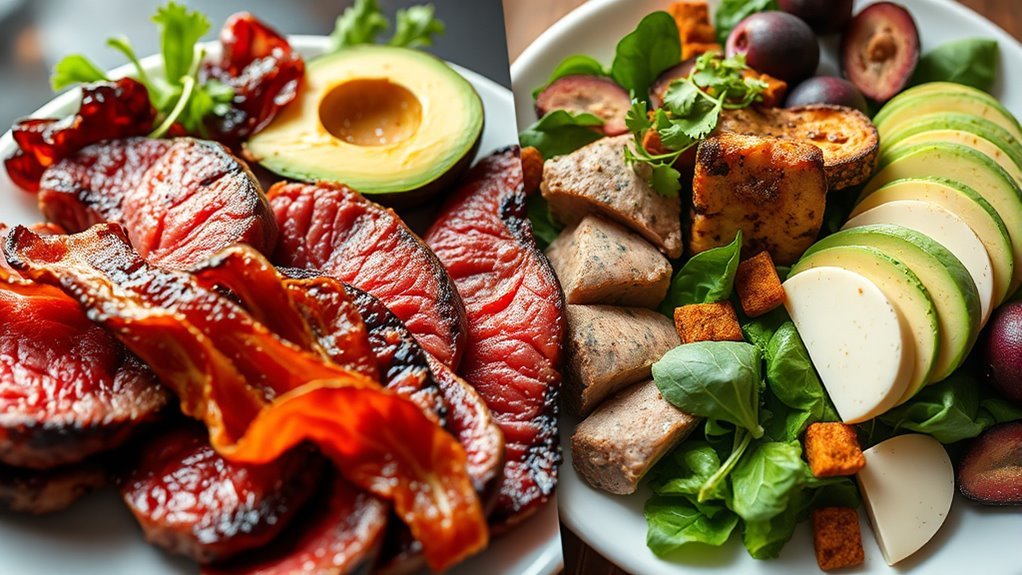The Carnivore Diet and Keto aren’t the same. While both emphasize low carb intake, the Carnivore Diet consists exclusively of animal products, like meat and eggs. In contrast, Keto incorporates healthy fats and low-carb vegetables, offering more nutritional variety. You might find the Carnivore Diet restrictive, whereas Keto allows for a broader food spectrum. Both diets can support weight loss and energy, but they also come with unique benefits and risks. Discover more about their differences ahead.
Overview of the Carnivore Diet

The Carnivore Diet, which primarily consists of animal products, has gained attention for its straightforward approach to nutrition. If you’re considering this diet, meal planning becomes essential, as it centers on foods like meat, fish, and eggs, which serve as your primary nutrient sources. You’ll find that this diet is rich in protein and healthy fats, providing the energy you need without the complexities of traditional meal prep. It’s a simple way to focus on nutrient density, allowing you to explore various cuts of meat and seafood while avoiding carbohydrates altogether. This approach can lead to increased satiety and, for some, improved mental clarity. Embracing the Carnivore Diet can offer you a unique sense of freedom in your food choices.
Overview of the Keto Diet

While the Carnivore Diet emphasizes an all-animal product approach, the Keto Diet introduces a different framework by focusing on low carbohydrate intake to shift the body into a state of ketosis. This metabolic state allows your body to burn fat for fuel instead of carbs, leading to potential keto benefits like weight loss, improved energy levels, and better mental clarity. However, there are some common keto misconceptions, such as the belief that you can’t enjoy fruits or vegetables on this diet. In reality, it’s about choosing low-carb options while incorporating healthy fats and proteins. By understanding these aspects, you can embrace a nutrient-dense diet that aligns with your lifestyle, providing freedom and flexibility in your food choices. Additionally, it’s important to prioritize healthy fats as they serve as the primary energy source in a keto diet.
Key Similarities Between Carnivore and Keto

Both the carnivore diet and keto emphasize a low-carb approach, which can lead to significant reductions in insulin levels and improved fat burning. By limiting carbohydrates, both diets promote ketosis, a metabolic state where your body utilizes fat for fuel instead of glucose. This shared focus on macronutrient composition can offer you similar benefits, including weight loss and enhanced energy levels.
Low-Carb Focus
When considering dietary approaches, it’s clear that both the carnivore diet and keto share a strong emphasis on low carbohydrate intake. This focus can lead to several low carb benefits, like improved blood sugar control and weight loss. By minimizing carbs, you may experience increased energy and mental clarity. However, it’s vital to recognize the low carb challenges as well. Shifting to either diet can cause initial fatigue or cravings as your body adapts. Additionally, while both diets can be nutrient-rich, it’s important to verify you’re getting a balance of vitamins and minerals. Embracing these diets can offer freedom in food choices, but always listen to your body and adjust as necessary for your unique needs. The metabolic state of ketosis, which both diets aim for, helps promote efficient fat burning and sustained energy levels.
Ketosis Promotion
As you immerse yourself in the carnivore diet or keto, you’ll find that both approaches effectively promote ketosis, a metabolic state where the body burns fat for fuel instead of carbohydrates. This shift can lead to significant ketosis benefits, including improved energy levels, mental clarity, and enhanced fat loss. By drastically reducing carb intake, both diets encourage your body to enter this fat-burning state. While the carnivore diet focuses solely on animal products, keto allows for low-carb vegetables and healthy fats, offering some flexibility. Ultimately, both paths can empower you to achieve your health goals, leveraging the body’s natural ability to thrive in a state of ketosis. Embracing either can be a liberating experience toward better health. Additionally, understanding the basics of the keto diet can provide valuable insights into how both diets function.
Fundamental Differences in Food Choices
While the carnivore diet emphasizes an exclusive intake of animal products, the ketogenic diet allows for a broader variety of food sources, including healthy fats, low-carb vegetables, and some dairy. This difference in food selection leads to varying dietary restrictions. On the carnivore diet, your options are limited to meats, fish, and animal-derived foods, which can feel restrictive for some. In contrast, keto offers flexibility, letting you incorporate non-starchy veggies and nutrient-dense fats, which can enhance meal enjoyment and nutritional variety. This freedom in food choices can help you find a more sustainable balance that meets your individual needs. Ultimately, the right diet for you will depend on your lifestyle, preferences, and health goals.
Nutritional Profiles: Carnivore vs. Keto
When comparing the nutritional profiles of the carnivore and keto diets, you’ll notice significant differences in macronutrient composition and food variety. The carnivore diet primarily focuses on animal products, resulting in higher protein and fat intake, while keto emphasizes a balance of fats, proteins, and limited carbohydrates. Additionally, the carnivore diet lacks dietary fiber, which can impact gut health, making it essential to reflect on how these factors align with your personal health goals.
Macronutrient Composition Comparison
Understanding the macronutrient composition of the Carnivore and Keto diets reveals considerable differences that can impact your nutritional choices. The Carnivore diet typically consists of nearly 100% animal-based foods, leading to high protein and fat intake, with protein sources primarily from meats and animal products. In contrast, the Keto diet focuses on a balance of macronutrient ratios, aiming for about 70% fat, 25% protein, and 5% carbohydrates, allowing for a broader range of food options, including avocados and nuts. While both diets promote low carbohydrate intake, their approaches to protein sources and overall macronutrient distribution differ considerably. Understanding these distinctions can help you choose a diet that aligns with your health goals and lifestyle preferences.
Food Variety Differences
The stark differences in food variety between the Carnivore and Keto diets greatly influence their nutritional profiles. On the Carnivore diet, your food selection is limited to animal products, which means you’ll consume primarily meat, fish, and animal-derived foods. This restriction can lead to high protein and fat intake but limits essential nutrients found in plants. In contrast, the Keto diet allows for a broader array of foods, including low-carb vegetables and dairy, offering more nutrient diversity. This flexibility can help you meet your nutritional needs better, despite its own dietary restrictions. Ultimately, both diets have unique approaches to food selection, affecting how you nourish your body and your overall health journey.
Fiber Content Analysis
One key difference between the Carnivore and Keto diets is their fiber content, which plays a crucial role in digestive health. The Carnivore diet, primarily meat-based, lacks traditional fiber sources, while Keto includes low-carb veggies. Here are some points to evaluate:
- Digestive Health: Fiber supports regular bowel movements and gut health; without it, you might experience digestive issues on Carnivore.
- Fiber Sources: Keto allows for a variety of low-fiber vegetables and some nuts, providing essential nutrients and fiber.
- Dietary Freedom: While Carnivore offers simplicity, Keto’s inclusion of fiber-rich options can enhance overall well-being and digestive function.
Ultimately, understanding these differences can empower you to make informed dietary choices tailored to your health goals.
Health Benefits of Each Diet
Both the carnivore diet and keto diet offer distinct health benefits that cater to different nutritional needs and preferences. The carnivore diet emphasizes animal products, which may enhance protein intake and support muscle growth, while potentially reducing inflammation for some. You might experience weight loss and improved mental clarity due to the absence of carbohydrate fluctuations. On the other hand, the keto diet focuses on healthy fats, which can help stabilize blood sugar levels and enhance fat-burning efficiency, promoting sustained energy. Each diet’s effectiveness hinges on individual goals and lifestyle choices. Ultimately, you can choose the one that aligns with your values and health aspirations, enjoying the freedom to explore what works best for your body. Additionally, both diets can promote stable blood sugar levels, which may contribute to better overall metabolic health.
Potential Risks and Considerations
While exploring the health benefits of the carnivore and keto diets, it’s important to also consider potential risks and considerations associated with each. Here are a few key points to keep in mind:
- Nutrient Deficiencies: Both diets can lead to imbalances, particularly lacking in essential vitamins and minerals, which could raise health concerns over time.
- Long-Term Sustainability: Adhering strictly to these diets might be challenging for many, leading to questions about their long-term feasibility and individual responses.
- Psychological Effects: Restrictive eating patterns can impact mental health, potentially causing social implications or feelings of isolation during meals. Additionally, nutrient deficiencies may contribute to irritability and mood swings, further complicating the psychological effects of such diets.
Ultimately, being aware of these factors can help you make informed decisions that align with your health goals and lifestyle.
Who Should Consider Each Diet?
If you’re considering a dietary shift, understanding who might benefit from the carnivore or keto diets can guide your decision.
| Diet Type | Ideal Candidates | Key Considerations |
|---|---|---|
| Carnivore Diet | Those with autoimmune issues | Nutrient deficiencies may occur |
| Individuals seeking rapid weight loss | Limited food variety | |
| Keto Diet | People with metabolic syndrome | Requires careful carb tracking |
| Those wanting stable energy levels | May include a broader food spectrum | |
| Athletes needing quick recovery | May require specific nutrient focus |
Carnivore candidates often thrive on simplicity, while keto recommendations suit those seeking balance. Both diets can empower you; choose one that aligns with your health goals and lifestyle. Additionally, understanding the fundamentals of the ketogenic diet can help inform your dietary choices more effectively.
How to Transition Between Diets
Shifting between the carnivore and keto diets can be straightforward, especially when you focus on gradual changes that suit your body’s needs. Here are three tips to help you navigate smoothly:
- Meal Planning: Start by incorporating more fatty meats and low-carb veggies into your meals. This helps ease your body into a higher fat intake.
- Gradual Changes: Gradually reduce your carb intake by swapping out high-carb foods with keto-friendly alternatives. Your body will adapt better this way.
- Listen to Your Body: Pay attention to how you feel. Adjust your meals based on energy levels and cravings, allowing for freedom in your choices while staying aligned with your dietary goals. Additionally, consider tracking your macros to ensure you maintain the proper balance of macro ratios for optimal ketosis.
Frequently Asked Questions
Can You Mix Carnivore and Keto Diets Together?
You can absolutely mix the carnivore and keto diets, creating a harmonious blend that dances between meat and fat. Think of it as crafting a symphony of flavors while maintaining carnivore keto compatibility. By focusing on high-quality meats and healthy fats, you’ll optimize nutrient intake without straying too far from either diet’s principles. Just remember to keep an eye on mixing macronutrients, ensuring you meet your body’s specific needs on this adventurous journey!
Are There Any Specific Supplements Recommended for Each Diet?
When following either diet, consider specific supplement types to fill any nutrient gaps. For the Carnivore Diet, you might need electrolytes, omega-3s, and vitamin D. On Keto, magnesium and potassium can be beneficial. Both diets can lack certain nutrient sources, so a good multivitamin or fish oil supplement might help. Remember, it’s important to listen to your body and adjust your supplement regimen as needed for peak health and energy.
How Do These Diets Affect Athletic Performance?
Studies show that athletes on a carnivore diet can experience a 20% increase in muscle recovery speed compared to traditional diets. While you may find benefits in endurance training due to higher protein intake, it’s essential to monitor nutrient balance. A diet focusing solely on animal products might lack essential vitamins and minerals, possibly affecting overall performance. To thrive, consider incorporating a variety of nutrient-dense foods alongside any specific dietary approach you choose.
What Are Common Mistakes When Starting Either Diet?
When starting either diet, common mistakes include poor meal planning and inadequate food sourcing. You might overlook the importance of variety, leading to nutrient deficiencies. It’s essential to plan balanced meals that include all necessary nutrients, even within strict guidelines. Additionally, sourcing high-quality meats and fats can affect your health results. Focusing on nutrient-dense options guarantees you enjoy the freedom of these diets while still meeting your body’s needs.
Can You Eat Dairy on the Carnivore Diet?
You might feel like a kid in a candy store when it comes to the Carnivore Diet, but can you eat dairy? Yes, you can, depending on the dairy types you choose. Many people enjoy full-fat options like cheese and heavy cream for their nutrient benefits. Just remember, some individuals might react differently to dairy, so it’s important to listen to your body. Enjoy the freedom to experiment while focusing on nutrient density!
Frequently Asked Questions
Is the Carnivore Diet the same as the Keto Diet?
No, the Carnivore Diet and the Keto Diet are not the same, although they share some similarities. The Carnivore Diet consists exclusively of animal products, including meat, fish, and animal-derived foods, while the Keto Diet allows for a broader range of foods, including non-starchy vegetables, dairy, and certain nuts and seeds, as long as they keep carbohydrate intake low to maintain ketosis. The primary focus of the Carnivore Diet is on protein and fat from animal sources, whereas the Keto Diet emphasizes maintaining a specific macronutrient ratio of fats, proteins, and carbohydrates.
What are the main differences in food choices between the Carnivore Diet and Keto?
The primary difference lies in the variety of allowed foods. The Carnivore Diet is restrictive and allows only animal-based foods such as beef, pork, chicken, fish, eggs, and some dairy products. In contrast, the Keto Diet includes a wider variety of foods while maintaining low carbohydrate intake. Keto dieters can consume non-starchy vegetables, nuts, seeds, and healthy fats like olive oil and avocado, making it more flexible and potentially easier to adhere to for some people.
Can you achieve ketosis on the Carnivore Diet?
Yes, it is possible to achieve ketosis on the Carnivore Diet. Since the diet is high in protein and fat while being extremely low in carbohydrates, it can induce ketosis, a metabolic state where the body burns fat for fuel instead of carbohydrates. However, individual responses can vary, and some may find it more challenging to maintain ketosis on a purely carnivorous diet compared to a more balanced Keto approach that includes moderate protein and healthy fats.
Are there any health risks associated with the Carnivore Diet compared to Keto?
Both diets can pose health risks, but the Carnivore Diet may have more pronounced concerns due to its extreme restriction of food groups. Potential risks include nutrient deficiencies (such as vitamins and fiber), increased cholesterol levels, and negative effects on gut health due to a lack of dietary fiber. The Keto Diet, while still low in carbohydrates, allows for more variety and can provide essential nutrients from vegetables and other food sources, potentially making it a safer long-term option for many individuals.
Which diet is easier to follow long-term, Carnivore or Keto?
The ease of following either diet long-term can vary greatly among individuals. Some may find the Carnivore Diet easier due to its simplicity and lack of food variety, which eliminates decision fatigue. However, others may struggle with the lack of food options and potential social challenges. The Keto Diet, with its wider range of permissible foods, may be more sustainable for many people, allowing them to incorporate a variety of flavors and nutrients, which can enhance adherence over time.
References
- https://www.health.harvard.edu/staying-healthy/the-carnivore-diet
- https://www.ncbi.nlm.nih.gov/pmc/articles/PMC8774942/
- https://www.webmd.com/diet/carnivore-diet-overview
- https://www.nutrition.org.uk/healthyliving/basics/dietary-fats.html
- https://www.mayoclinic.org/healthy-lifestyle/nutrition-and-healthy-eating/expert-answers/carnivore-diet/faq-20445010
- https://www.kdnuggets.com/2022/01/carnivore-diet-vs-keto.html
- https://www.cdc.gov/nutrition/index.html
- https://www.bbc.com/future/article/20200710-what-is-the-carnivore-diet-and-should-you-try-it


